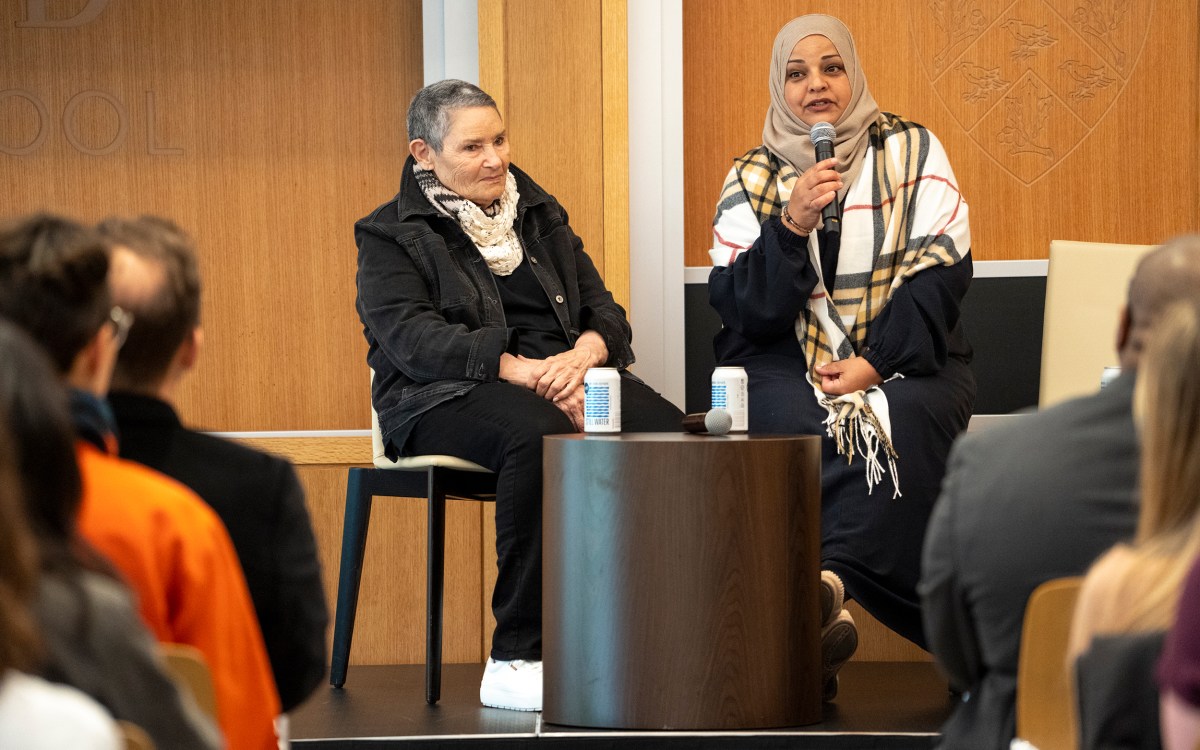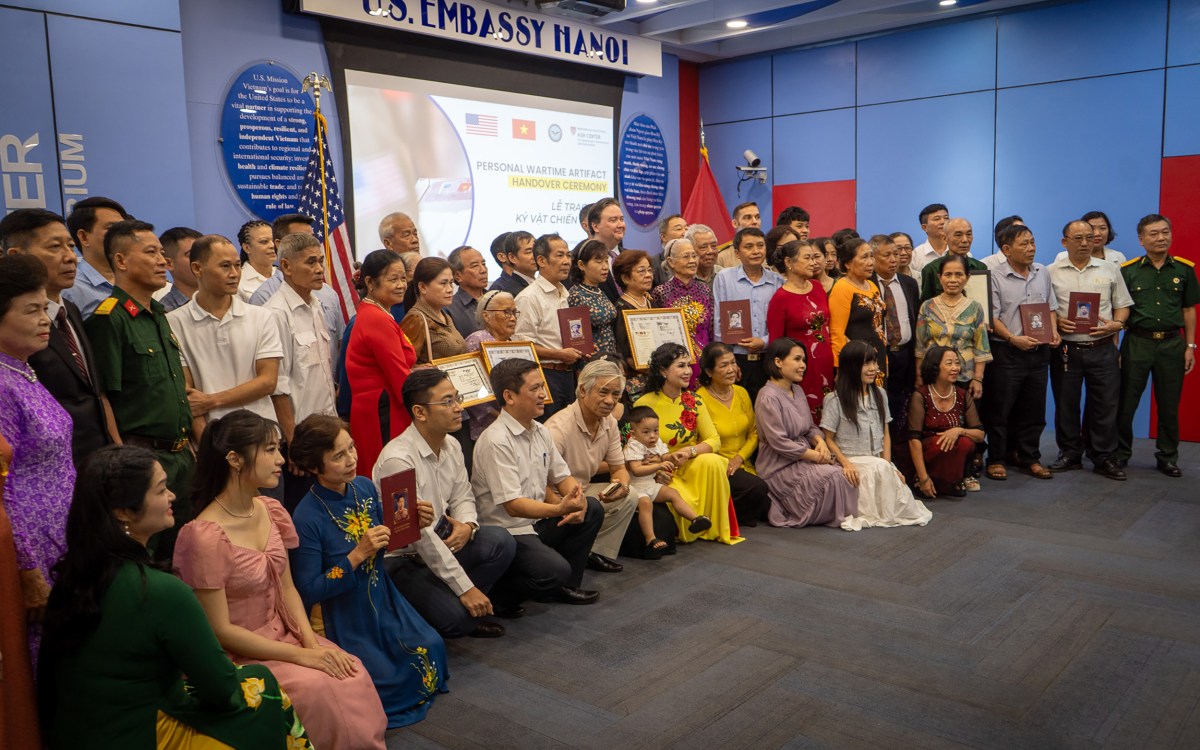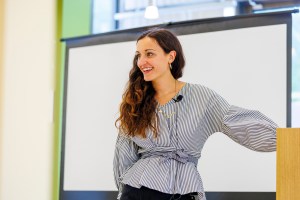Nation & World
-

A tale of three cities — and their turn to right in heartland
Government professor’s new book focuses on roles of race, class, and religion in evolution of former New Deal Democrats
-

Why do election polls seem to have such a mixed track record?
Democratic industry veteran looks at past races, details adjustments made amid shifting political dynamics in nation
-

You’d never fall for an online scam, right?
Wrong, says cybersecurity expert. Con artists use time-tested tricks that can work on anyone regardless of age, IQ — what’s changed is scale.
-

Two bereaved mothers who know price of war work for peace
Layla Alsheikh, Robi Damelin argue path to Mideast reconciliation begins with acknowledging common humanity
-

Taking the phones out of school
In podcast episode, experts discuss growing movement to restrict devices in class
-

‘The first new information we’ve heard in 50 years’
Unseen Legacies researchers are answering decades-old questions about the fates of Vietnamese soldiers
-
Buddhism and the art of negotiation
Would the Buddha be an effective arbiter in a complicated and contentious land trust dispute or a messy divorce? For many experts, the answer is a resounding yes.
-
HLS: When legal scholars become media stars
Sharp wit, high energy, and laughter were tempered by serious undertones and a message for law students considering a future in journalism last week (Nov. 8) at the Harvard Law School (HLS).
-
Researcher finds roots of fundamentalism in 16th century Bible translations
The English Reformation — heyday of religious change — spurred a fundamentalist approach to Bible reading, according to new research by a Harvard professor.
-
Closing the ‘achievement gap’
The achievement gap in American K-12 schools is well-documented, and is characterized by racial and class differences.
-
Islam in the contemporary world: Questions of interpretation
“Interpreting the Islamic Tradition in the Contemporary World” was the title of the gathering, the first annual Prince Alwaleed Bin Talal Islamic Studies Program Conference.
-
Scholars ask, ‘How does gender affect negotiation?’
To most of us, negotiation is a way of getting happily to the end of a problem. As in: Who’s going to do the dishes tonight? Let’s talk.
-
Sovereignty vs. global responsibility
As part of Harvard Business School’s International Week, an annual event to highlight the cultural diversity at the School, Srgjan Kerim, president of the 62nd session of the United Nations General Assembly, delivered the keynote address at the Spangler Auditorium on Oct. 25.
-
KSG panel: Early campaigning takes voter toll
The intense media coverage of a small group of presidential hopefuls is prematurely narrowing the field of worthy nominees, many political experts claim.
-
Dowd works the crowd at White Lecture
Journalism, the saying goes, is the first draft of history.
-
Vermont and New Hampshire, geographic twins, cultural aliens
Ever wonder about Vermont and New Hampshire?
-
Looking at China’s role in Africa
China’s increasing influence in Africa is a double-edged sword that wields the potential for prosperity and despair.
-
A vision of collaboration, mutual respect
Harvard and South Asia go way back.
-
Chidambaram talks about ‘rich poor’ India
At 60 years old, India is a young nation. It is also a country that is both rich and poor.
-
Mayor Bloomberg receives HSPH’s Richmond Award
Mayor Michael R. Bloomberg of New York City has been named the 2007 recipient of the Julius B. Richmond Award, the highest honor given by the Harvard School of Public Health (HSPH).
-
Phyllis Schlafly speaks out on judicial activism
The woman credited with defeating the Equal Rights Amendment was on the Radcliffe campus last week to discuss the current target in her crosshairs: judicial activism.
-
Nobel laureate Yunus gives Wiener Lecture
On Oct. 13, economist and microfinancing pioneer Muhammad Yunus stood in front of a cheering capacity crowd at the John F. Kennedy Jr. Forum. One year earlier, to the day, he had received the 2006 Nobel Peace Prize — news that Yunus said “exploded with happiness all over Bangladesh.”
-
Upcoming Supreme Court cases examined
What’s up this year at the U.S. Supreme Court?
-
Inequality and justice, why, where, when, who
“Universities are inequality machines,” Christopher Jencks, Malcolm Wiener Professor of Social Policy at Harvard’s Kennedy School of Government, said. “Combating inequality works only by leveling up … which often takes…
-
The truths lost and gained in wartime
The symposium “War and Truth” explored the modern resonance of an ancient sentiment: “In war, truth is the first casualty.” It’s attributed to the Greek tragedian Aeschylus (525-456 B.C.) and…
-
How Sputnik changed U.S. education
Education experts said Oct. 4 that the United States may be overdue for a science education overhaul like the one undertaken after the Soviet Union launched the Sputnik satellite 50 years ago, and predicted that a window for change may open as the Iraq war winds down.
-
JFK and the Cuban missile crisis — a new assessment
The Cuban missile crisis of October 1962 has been called the “single most serious moment in human history.” During the 40 years of the Cold War, it was the closest the United States and the Soviet Union ever came to nuclear war.
-
Treating workers like people: A history
“The Human Relations Movement: The Harvard Business School and the Hawthorne Experiments (1924-1933),” the first in a series of exhibits to commemorate the 100th anniversary of Harvard Business School (HBS), is on view through Jan. 17 at the School’s Baker Library.
-
Labor and management, together at last
Harvard University hosted “The Future of Labor Forum” last week (Oct. 2), a first-ever conference that brought together prominent voices from the sometimes adversarial worlds of management, unions, government, and the academy.
-
‘Who is the human in human rights?’
What does it mean to be human? Are all people the same, and if so, entitled to an identical set of rights and treatment? Or, in the age of globalization, do wide-ranging cultural, moral, religious, and political beliefs and behaviors make the definition of humans — and therefore human rights — contingent, that is dependent on circumstances? In that context, can human rights ever be truly universal?
-
Phillips Brooks House welcomes first fellow
With its long tradition of service and community involvement, the Phillips Brooks House (PBH) — composed of the Phillips Brooks House Association, the student-run, public service organization, and the Harvard Public Service Network, which supports more than 45 student-led service groups — extended its scope last week as it welcomed the first Phillips Brooks House Fellow to campus.
-
Pre-emption: Preventive, coercive, or both?
In the wake of 9/11, how to defend the country in a new age of terrorism has sparked an ongoing, often divisive debate. Some consider tactics like pre-emption, the right to use force to respond to an imminent threat, and preventive war, the use of force to prevent a serious threat from worsening over time, acceptable, even if it means occasionally turning a blind eye to the law to preserve national security. Others argue such methods are never warranted and violate the basic tenets of a free, democratic society.
-
Wade hails ‘African renaissance’
His Excellency Abdoulaye Wade, president of the Republic of Senegal, visited Harvard last week (Sept. 27). Looking younger than his 81 years, he walked onto the stage at the John F. Kennedy Jr. Forum to the sound of a tama, a West African “talking drum” used to telegraph complex messages.
-
Conference celebrates tribal governance
Imagine the map of the United States as it really is. Not 50 states, but 50 states plus 562 sovereign nations — the 562 federally recognized American Indian tribes and communities that exist within U.S. borders.
-
At Kennedy School, Iraqi foreign minister outlines recent progress
“Iraq is back,” the country’s foreign minister, Hoshyar Zebari, told his audience at the John F. Kennedy Jr. Forum at the Kennedy School of Government Oct 1. With the dictatorial regime of Saddam Hussein replaced by a “constitutional, democratically elected government,” Iraq is in the midst of “a truly historic transformation” as important as “any event in the Middle East” over the past hundred years.
-
New index quantifies performance of governments
“All citizens of all countries desire to be governed well.” That plain statement — universal and self-evident — is the first sentence of a Harvard-generated report released this week in London. According to its authors, it is the first attempt in the world to systematically and objectively quantify governance.
